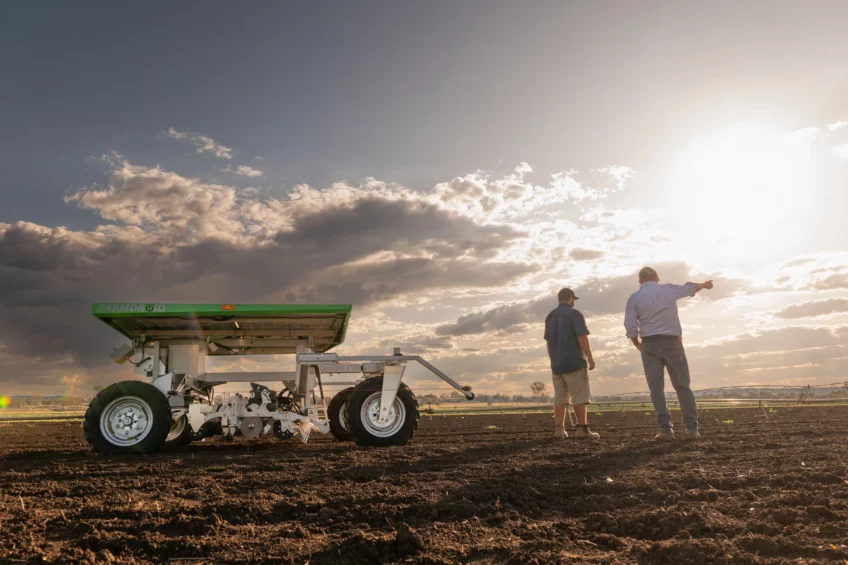Large Australian vegetable grower combats weeds with 2 different weeding robots

On a significant part of its 405-hectare open field vegetable area, the Australian company Qualipac deploys 2 robots, each with its own method of tackling weeds. The lightweight, autonomous FarmDroid uses solar power and GPS-guided precision to sow and weed. The robust Stout Cultivator is towed behind a tractor and uses AI-based image recognition. Both reduce the need for labour and herbicides, but each requires a different approach.
Qualipac is a family-owned company in Australia that focuses on growing, packing and distributing high-quality vegetables. According to Troy Qualischefski (45), manager of Qualipac Produce, the cost of weed control had gotten out of hand. This motivated the company to explore robotic solutions. “Weed control was always an incidental expense that we never really included in our calculations, but we had to deal with it nonetheless.”
Qualipac decided to investigate the potential of mechanical weeding robots. This would also help the company deal with any labour shortages and reduce herbicide use. After thorough research, the fourth-generation farmer first opted for the Danish FarmDroid FD20, which arrived at the farm in 2023. Later that year, Qualipac received the Stout Smart Cultivator from the United States.
Text continues below box
FarmDroid: lightweight, efficient and precise
The purchase of the FarmDroid (price: €137,588/ $158.166) has proven successful. “We are planning to buy more FarmDroids,” says Troy. “FarmDroid has just developed a seeder suitable for larger seeds like maize, beans, pumpkin and cotton. We are looking forward to that machine coming to market.”
The FarmDroid is highly precise. “In some parts of the farm, we no longer need manual weed control. It has small blades that cut between the rows. It is both a seeder and a weeder. The location of each seed is recorded with precise GPS data. Once the crops start to grow, the FarmDroid uses those GPS coordinates to weed around the seedlings.”

According to Troy, both the build quality and performance of the machine are excellent. “The FarmDroid has been perfect so far, with hardly any need for repairs. That is because the machine has a maximum speed of 900 metres per hour. There is hardly any wear. It is a remarkable machine, powered by solar energy. Soil compaction is minimal. It is lightweight, weighing only 800 kg. We now space our seeds at 30 cm instead of 27, so we save on seed. And with higher germination rates, our emergence in broccoli has improved by 10%. Mechanical weed control also leads to stronger plants and a more uniform harvest.”
Troy also praises the support and service for both the FarmDroid and the Stout Cultivator. The companies can log into the machines remotely from Denmark or the US. He expects both machines to keep improving. “You need patience.” He has not calculated a precise payback period for the FarmDroid. “Investments are not recouped through labour or diesel savings. But if you increase yield by 10% across many hectares, and reduce seed use by 10%, you get value for money.”

Stout Cultivator: simple to use and effective
The Stout Cultivator (price: €315,307/$362.471 ) is mainly used in pumpkins. “In the 2 years we have had the machine, we have never needed to weed pumpkins manually,” says Troy. “It performs perfectly. We have not used it in broccoli yet, because the plant spacing is slightly different. But we do plan to use it for what we call ‘processing broccoli’.”

The Stout is simple and effective, says Troy. “The main benefit is the reduction in labour. That is what it is all about. With people, there are costs, opinions, and interpersonal dynamics. With the Stout, you attach it to a tractor and it gets the job done.”
Troy emphasises that the Stout is capable of handling many more hectares. “It gives us the confidence to expand into other fields. We can open up new land on farms we have purchased. These were not previously horticultural properties, and other types of weeds are a challenge there.” While the machine saves on labour costs, Troy does not yet have an exact payback figure.

Robots: you need to do your homework
Troy believes that autonomy and robotics will transform agriculture. “It all depends on the farmer’s imagination. If you do not have the right people on the farm to make it work, the machine ends up as a decorative item in the shed. You get out of the robot what you put in. At Qualipac, we always want to keep progressing in this area, but you have to do your homework before committing. Every tech company wants to sell you a machine. I would not buy from a start-up. Pioneers always get the arrow in the head.”

“All in all, robots are part of the puzzle,” says Troy. “Good people to work with them are the other part. Even though they are robots, you still need people who are meticulous, enjoy working with them, and understand how they function. Using robots is exciting and much depends on your vision. How far do you want to go? Australian farmers are still cautious about buying robots. The sector is not at the top of a cycle — rather at the bottom. And farmers still like to buy tractors…”



